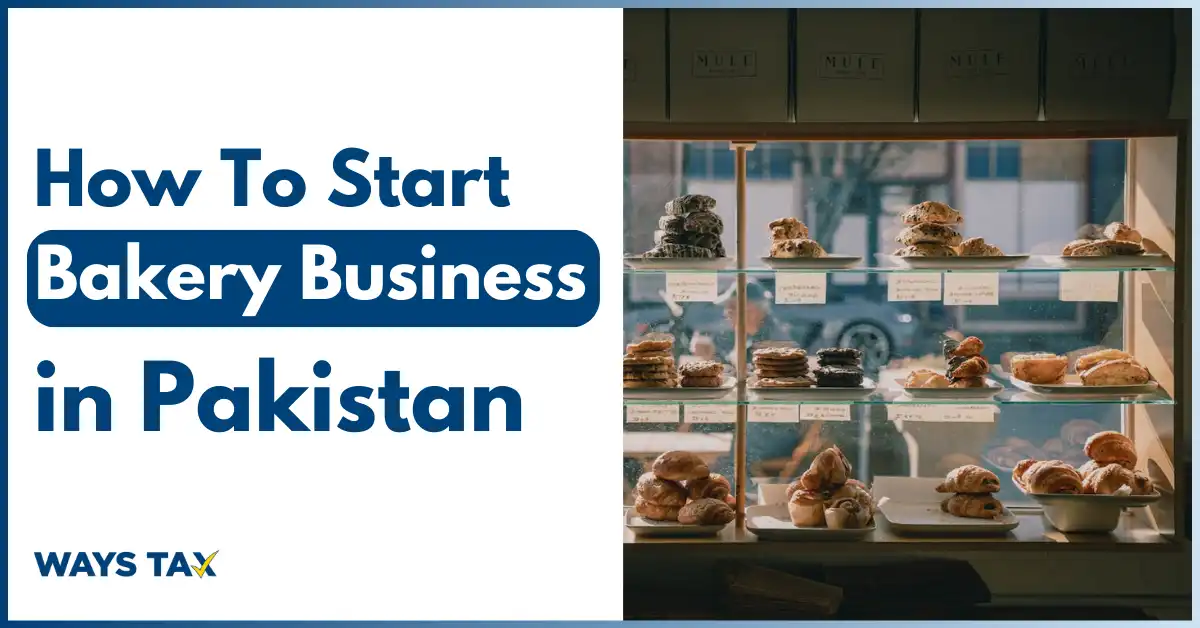How to Start a Bakery Business in Pakistan: An Ultimate Guide
Pakistan’s bakery industry is growing fast and is expected to reach $25 billion in revenue by 2025. It’s also set to grow by 6.93% every year from 2025 to 2029. With such a huge demand, starting a bakery can be a highly profitable business in the country.
From fresh-out-of-the-oven croissants to desi delights like Sheermal and Nan Khatai, Pakistanis have a deep love for baked goods. Whether you dream of running a cozy neighborhood bakery or a large-scale commercial setup, now is the perfect time to turn that vision into reality.
However, starting a bakery business isn’t just about baking—it’s about strategy, compliance, and smart planning. From registering your business and acquiring licenses to setting up the perfect menu and marketing your brand, there are many steps involved.
This detailed, beginner-friendly guide will walk you through every step of how to start a bakery business in Pakistan, ensuring you comply with legal requirements while maximizing your chances of success.
Your Bakery Success Starts Here!
Ways Tax will simplify your business registration, tax filings, and licensing procedures.

Now, let’s go step by step on how to start a successful bakery business in Pakistan.
Step-by-Step Guide on How to Start a Bakery Business in Pakistan
Some of these steps are also useful if you are searching for how to start a bakery business in Pakistan online.
1. Market Potential & Business Overview
The bakery industry is experiencing rapid expansion throughout Pakistan since middle-class areas in urban locations are steadily rising in number.
A bakery enterprise maintains substantial profitability since its customer base for cakes and bread along with biscuits and sweets and nimko and more confectionery items keeps increasing.
The Pre-Feasibility Study conducted by SMEDA shows that starting a small-scale bakery in Pakistan requires an investment of Rs. 3.98 million which can generate first-year revenues of Rs. 18.35 million.
The company will achieve profitability after 2.61 years while providing an Internal Rate of Return (IRR) of 53%.
2. Identifying Your Target Market

You must understand your target market because this knowledge allows you to create bakery offerings that match customer demands and tastes.
To collect relevant audience information follow these procedures:
1. Demographics
- Age: Product preferences differ among age categories which determine the types of products they will prefer. Young adults tend to choose trendy items including cupcakes but adults typically prefer traditional breads as well as healthy choices. Older individuals typically prefer classic baked goods.
- Income: Your product selection should reflect the financial standing of your serving customers. Product affordability determines which customers from low-income groups buy daily essentials while high-income individuals buy premium personalized items.
- Location: Where your business stands will determine the products you provide. Both residential neighborhoods tend to buy basic bread but locations with nearby offices need more snack offerings accompanied by event-specific items including cakes.
2. Psychographics
- Health-Conscious: The market shows increasing interest in purchasing products with no sugar or gluten and those labeled organic.
- Occasional Buyers: Special-event customers tend to choose expensive handmade cakes and treats for their particular occasions.
By understanding these factors, you can tailor your bakery’s products and marketing strategies to meet the needs of your ideal customers.
3. Analyze Competition in the Bakery Business
Analyzing competitors becomes essential during the start of a bakery business since it helps discover market openings and sets better marketplace positions.
Here’s how to do it effectively:
1. Identify Direct and Indirect Competitors
- Direct Competitors: Other bakeries offering similar products like cakes, bread, and pastries in your area.
- Indirect Competitors: Other businesses operating as cafes and restaurants or grocery stores that provide baked goods alongside their usual products also fall into this category.
2. Research Products and Services
- Product Range: Study the full product selection of your competitors to understand which products they provide including bread, cakes, and cookies along with gluten-free and vegan choices.
- Pricing Strategy: The price point evaluation requires examining comparable product rates to determine your expected bakery sector (budget-level mid-range or premium category).
3. Competitor Location and Accessibility
- The locations of your competitors need assessment. The strategic placement of their business occurs in either heavily traveled locations or educational institutions and workplace districts.
Development of delivery services or partnerships with FoodPanda platforms will help your business stay competitive.
4. Competitor Marketing and Branding
- Social Media Presence: Evaluate how often they post and maintain their online presence.
- Branding: Review their visual identity (logo, packaging, store design) and how they differentiate their brand.
- Online Ordering: Does your competitor offer online ordering or delivery services? The service creates a valuable chance to grow customer numbers.
This research will help you understand product gaps, pricing, and effective marketing strategies for your bakery.
4. Define Your Bakery Business Model

Based on your research, define your business model. Some common bakery models include:
- Home-Based Bakery: A low-cost option suitable for starting small with online orders and deliveries.
- Retail Bakery: A traditional brick-and-mortar store that caters to walk-in customers.
- Wholesale Bakery: Selling large quantities to businesses like cafes, restaurants, and supermarkets.
5. Develop a Business Plan
A well-structured business plan will guide the growth and success of your bakery.
This should include:
- Executive Summary: Overview of your bakery business, products, and services.
- Market Analysis: Understand customer preferences, industry trends, and competition to identify business opportunities.
- Products and Services: List the bakery items you will offer, such as cakes, pastries, bread, and any special or custom products.
- Operations Plan: How your bakery will operate, including sourcing raw materials, production processes, and delivery logistics.
- Marketing Strategy: How you will attract and retain customers (social media, promotions, partnerships).
- Financial Plan: Budget for startup costs, revenue projections, and funding sources.
6. Financial Plan & Business Viability
According to SMEDA’s financial analysis, the bakery business can break even in 2.61 years, with an expected 5% annual increase in production and a 10% increase in sales price per year.
1. Investment & Financing
The total investment required is approximately Rs. 3.98 million, which can be financed through:
- 50% Owner’s Equity: Rs. 1.99 million
- 50% Bank Loan (at 15% annual interest)
2. Projected Profits & Growth
- Year 1 Revenue: Rs. 18.35 million
- Growth Rate: 5% per year
- NPV (Net Present Value): Rs. 8.31 million
Efficient supply chain management and reducing product wastage will be key factors in maximizing profitability.
7. Register Your Business and Legal Compliance

Ensure that your bakery operates legally by following these steps:
- Business Registration: Register your bakery with the appropriate authorities. Depending on your business type, you may need to register with the Securities and Exchange Commission of Pakistan (SECP) or the Registrar of Firms to make it legally recognized.
- Food Safety and Health Licenses: Obtain the necessary health and safety certifications from the Punjab Food Authority (PFA) or Food Safety and Standards Authority of Pakistan (FSSAI).
- Tax Registration: Sign up for Sales Tax and Income Tax with the Federal Board of Revenue (FBR). Keeping accurate financial records and filing taxes on time is important for legal compliance and smooth business operations.
- Municipal Licenses: In some cities, bakeries are required to obtain specific licenses from local municipal authorities for operating.
You can consult Ways Tax for assistance in legal registrations and compliance.
8. Setting Up Your Bakery
Let’s see what you need to consider in this step
1. Space Requirement
- Production Unit: 5,000 sq.ft. (for baking, storage, and equipment)
- Retail Outlet: 750 sq.ft. (for customer sales)
- Estimated Monthly Rent: Rs. 75,000
2. Required Machinery & Equipment
To run an efficient bakery, you’ll need the following essential equipment:
| Equipment | Quantity | Cost (Rs.) |
| Flour Sifter | 1 | 250,000 |
| Mixer (Cakes & Cream) | 1 | 250,000 |
| Oven (8×8 ft) | 1 | 400,000 |
| Deep Freezers | 2 | 70,000 |
| Frier and Burner | 4 | 24,000 |
| UPS & Batteries | 5 | 150,000 |
| Miscellaneous Tools | – | 100,000 |
| Total Equipment Cost | – | Rs. 1,294,400 |
3. Furniture & Fixtures
Your bakery should have a visually appealing display and a cozy atmosphere to create a welcoming experience for customers.Some essential items include:
| Item | Cost (Rs.) |
| Renovation & Interior | 200,000 |
| Air Conditioner | 60,000 |
| Weighing Scales | 10,000 |
| Signboard | 20,000 |
| Total Cost | Rs. 440,000 |
4. Office & Billing Equipment
To efficiently manage sales, you’ll need:
- Computer & Billing Software: Rs. 125,000
- Billing Machine: Rs. 15,000
5. Sourcing Raw Materials
Your raw material suppliers will directly impact the quality of your baked goods. Key ingredients include:
- Flour (local or imported)
- Butter, Eggs, Milk
- Sugar, Honey, Sweeteners
- Flavorings (Vanilla extract, cocoa powder, etc.)
- Packaging Materials
Build strong connections with trusted suppliers who offer high-quality ingredients at affordable prices. This will help maintain consistent product quality and ensure smooth production.
Set Up Your Bakery the Right Way!
Get our help for professional help with tax registration, food safety certifications, and more.

9. Ideal Cities for Investment
If you’re looking to set up a bakery and confectionery shop, SMEDA suggests investing in smaller cities with a rising middle-class population, such as:
Sargodha, Sheikhupura, Gujarat, Sukkur, Hyderabad, Noshehra, Charsadda, Quetta, Khuzdar, and Gilgit.
In major cities like Lahore, Karachi, and Islamabad, middle-income neighborhoods are the best locations for a bakery business.
10. Human Resource Requirements
A bakery requires a well-trained staff for smooth operations. The following team is recommended:
| Position | No. of Employees | Monthly Salary (Rs.) |
| Manager | 1 | 25,000 |
| Master Chef | 2 | 20,000 each |
| Bakers/Assistants | 3 | 15,000 each |
| Sales Staff | 4 | 12,000 each |
| Cleaner | 1 | 10,000 |
| Total Monthly Salaries | 12 Employees | Rs. 190,000 |
Hiring skilled bakers is essential to ensure high-quality products and customer satisfaction.
11. Branding & Marketing for Your Bakery
Building a strong brand and marketing effectively is key to the success of your bakery. It creates recognition, and trust, and attracts customers.
1. Branding Your Bakery
- Identity: Define your bakery’s mission (why it exists) and vision (where it’s headed). For example, offering fresh, organic, or healthy baked goods could be a core message.
- Personality: Decide your bakery’s tone. Is it casual, premium, or family-friendly? This will influence your visuals and customer interaction.
- Name & Logo: Pick a memorable and catchy name for your bakery and create a distinctive logo. Make sure it represents your brand’s values and appeals to your target customers.
2. Marketing Your Bakery
- Target Audience: Identify your ideal customers (young professionals, families, health-conscious individuals, etc.).
- Digital Presence: Create a website, set up social media accounts, and consider launching an online store. Share high-quality photos of your products to attract and engage online customers.
- Social Media & Content: Use Instagram, Facebook, and YouTube to showcase your bakery’s story, behind-the-scenes processes, and promotions.
- Local Marketing: Partner with local businesses, sponsor events, or offer discounts to build awareness. Use flyers and posters to engage the local community.
- Customer Engagement: Introduce loyalty programs, special discounts, and seasonal offers to encourage repeat customers and build long-term relationships.
Strong branding and marketing will help your bakery stand out and attract a consistent stream of customers.
Bakery Business Trends & Demand in Pakistan
Growing Demand for Baked Goods
Pakistan’s bakery industry is rapidly growing, with increasing demand for:
- Birthday & Wedding Cakes
- Customized Bakery Items
- Healthy & Organic Baked Goods
- Gluten-Free and Sugar-Free Products
- Online Bakery Orders & Deliveries
Why is the Bakery Business Profitable?
- The industry is valued at billions of rupees and is growing every year.
- High Demand in Major Cities – Karachi, Lahore, and Islamabad have a strong market for quality bakery products, driven by consumer preference for fresh and premium baked goods.
- Growth of Online Sales – The increasing use of food delivery services has made it easier for bakeries to sell their products online, expanding their reach and customer base.
How Ways Tax Can Help?
Starting a bakery in Pakistan requires navigating complex legal and tax requirements.
Ways Tax can simplify this process for you by offering expert services in the following areas:
- Business Registration: Ways Tax helps you register your bakery with relevant authorities, such as SECP and the Registrar of Firms, ensuring your business is legally recognized.
- Tax Registration: They assist with Sales Tax and Income Tax registration with the Federal Board of Revenue (FBR), making sure you’re compliant with Pakistan’s tax laws.
- Licenses and Permits: Ways Tax ensures you acquire all necessary licenses, including health and safety certifications from local food safety authorities like PFA or FSSAI.
- Ongoing Compliance: They provide ongoing support in managing taxes, filing returns, and maintaining financial records to ensure your bakery runs smoothly and remains compliant.
With Ways Tax handling your legal and tax matters, you can focus on growing your bakery business while staying compliant with all necessary regulations.
Need Help with Bakery Licensing?
Let Ways Tax guide you through the process and ensure you’re fully compliant with local regulations.

Wrapping Up
Yes! The bakery business is a high-demand, profitable industry in Pakistan, especially in urban and semi-urban areas. With a strategic location, high-quality products, and effective marketing, you can earn substantial profits within the first 2-3 years.
If you have a passion for baking and follow the right business model, your bakery can become a leading brand in your area.
Now that you have learned how to start a bakery business in Pakistan, just take the first step and enjoy the success

